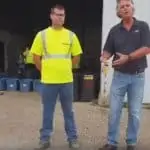

Applying the Lessons Learned – 1383 Compliance to your composting and food recovery planning can help make your program more sustainable.
SCS Engineers developed an SB 1383 Roadmap, which we customized for each municipality. The Roadmap outlines the requirements of SB 1383 by topic and by the responsible party. The Roadmap helped municipalities to plan for SB 1383 compliance, including a schedule for implementation, monitoring, reporting, and enforcement. Because SB 1383 is not only the responsibility of the Solid Waste Department, the Roadmap outlines the responsibilities of other municipal departments, including Administration, Finance, Purchasing, Fleet, Parks, etc.
SB 1383 requires the completion of capacity studies for organic waste recycling and edible food recovery. The Organic Waste Recycling capacity planning includes collecting data on the amount of organic waste (in tons) that will be disposed of, the amounts in tons of existing organic waste recycling infrastructure, both within and outside the county, that is available, and the amount of new or expanded capacity that will be needed to process the organic waste identified as being disposed of.
For the edible food recovery capacity planning, the counties had to estimate the amount of edible food that would be disposed of by commercial edible food generators, the existing capacity for food recovery organizations available in the County, the proposed or expanded food recovery organization that will be used to recover the edible food generated, and the new or expanded capacity that is necessary to recover the edible food that is generated.
It is a challenge for municipalities to meet these requirements, but feasible and sustainable using the SB 1383 Roadmap. Learn more on Wednesday, January 25, 2023, at the USCC Compost 2023 conference. During Session D1, the California Track Regulatory Trends and Experience at 8:15 – 9:45 am, Srividhya Viswanathan and Michelle Leonard discuss the Lessons Learned – 1383 Compliance, much of which is applicable for many evolving programs nationwide.
Here at SCS, we work for developers, industry, and manufacturers to help them run cleaner, safer, and more efficiently. This PBS video provides insight into how SCS brings value to the waste industry, our clients, and, most importantly, our communities.
You may ask yourself, don’t pig farms create pollution? Yes, but even that waste is reusable!
Did you know the food you buy in the grocery is supported by our environmental experts? Learn more about SCS’s environmental engineers and consultants who bring contaminated properties back to life, lower and capture greenhouse gases for fuels and renewable energy, and make possible a brighter future.
If you are interested in becoming an SCS Engineers employee-owner, watch our comprehensive video to see the breadth of services our teams offer.

Webinar Description
A waste characterization study is an important tool for helping local governments and private companies make decisions on the best solid waste management programs, policies, and technologies to reduce short-lived climate pollutants. Knowing what materials comprise your waste stream will help you establish the right mix of waste diversion and energy programs to make your community more sustainable.
This webinar provides information on how to conduct a waste characterization study, what data you can expect to obtain from a study, and how it can be used to make solid waste program and policy decisions. Topics of discussion during the webinar include:
Webinar access:
Join WebEx meeting
Meeting number (access code): 648 518 922
Join by phone
+1-415-655-0002 US Toll
Global call-in numbers
Thank you to the United Nations Environment, Climate & Clean Air Coalition (CCAC) for sponsoring this valuable event.